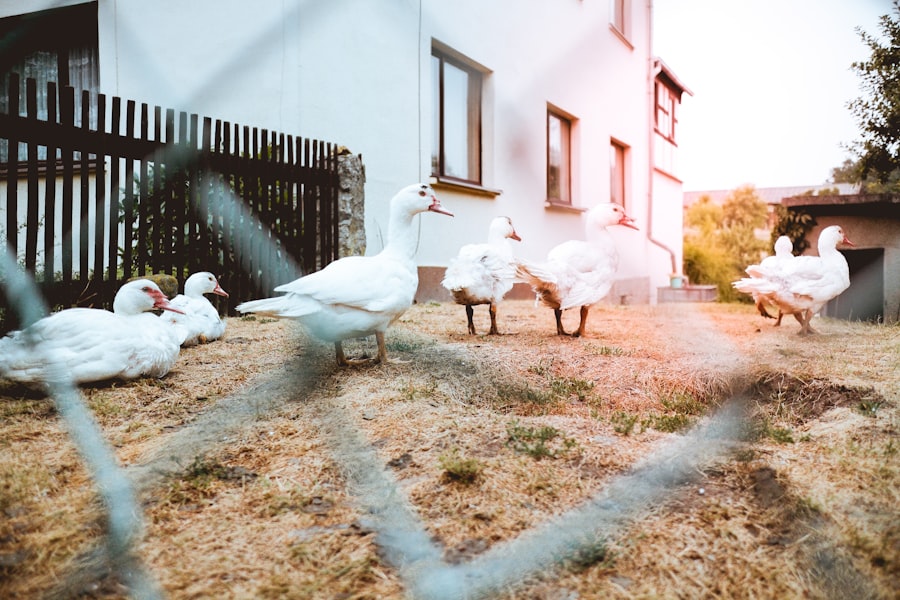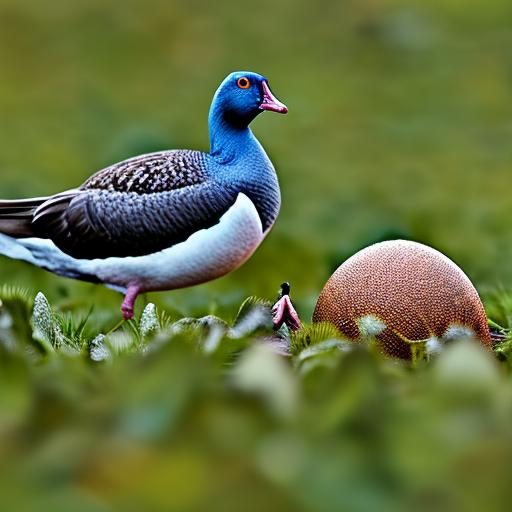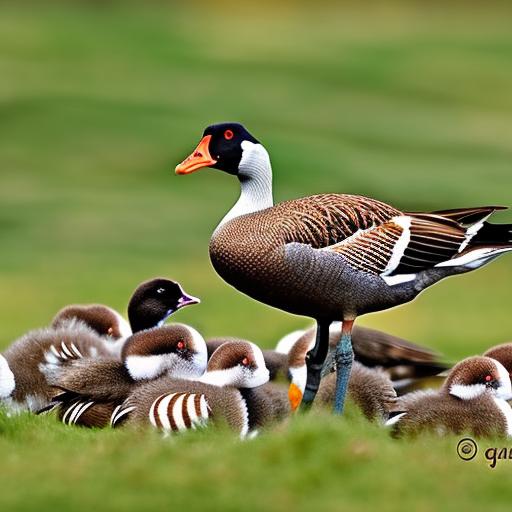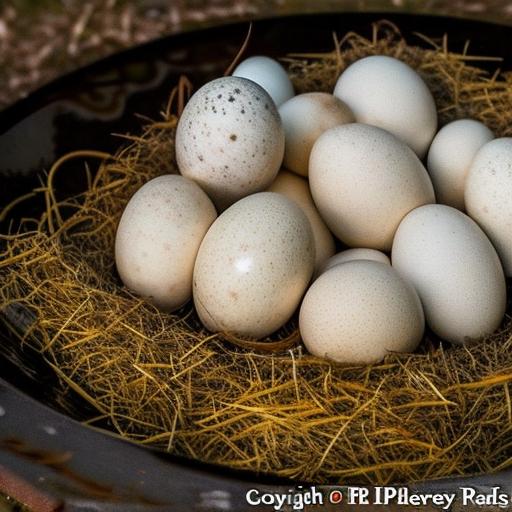Breeding geese eggs is a rewarding and challenging endeavor that requires careful planning and dedication. Geese are known for their strong maternal instincts and can be excellent parents, making them ideal for breeding. By breeding geese eggs, you can not only increase the population of these beautiful birds but also enjoy the benefits of fresh eggs and potentially start a small business.
One of the main benefits of breeding geese eggs is the ability to have a constant supply of fresh eggs. Geese eggs are larger than chicken eggs and have a rich, flavorful yolk. They are also highly nutritious, containing essential vitamins and minerals. By breeding geese eggs, you can have a sustainable source of these delicious and healthy eggs for yourself and your family.
However, breeding geese eggs also comes with its challenges. Geese can be territorial and protective of their nests, which can make handling the eggs difficult. Additionally, geese require a suitable environment for breeding and raising their young, which can be time-consuming and costly to set up. It is important to be prepared for these challenges and have a plan in place to overcome them.
Key Takeaways
- Breeding geese eggs requires careful selection of the right geese and creating an ideal environment for breeding.
- Key factors to consider during geese egg incubation include temperature, humidity, and turning the eggs regularly.
- Hatching geese eggs requires patience and attention to detail, including monitoring the eggs for signs of hatching and providing a safe and warm environment for the goslings.
- Caring for goslings involves providing proper nutrition, warmth, and protection from predators.
- Common problems in breeding geese eggs include infertility, egg breakage, and disease, which can be addressed through proper management and veterinary care.
Selecting the Right Geese for Breeding: Tips and Tricks
When it comes to selecting geese for breeding, there are several factors to consider. First and foremost, you need to choose geese that are healthy and free from any genetic defects or diseases. Look for geese that have good body conformation, strong legs, and bright eyes. Avoid birds that appear weak or sickly.
Popular breeds for breeding geese eggs include Toulouse, Embden, and Chinese geese. Toulouse geese are known for their large size and excellent meat production. Embden geese are also large birds with white feathers and are often raised for meat as well. Chinese geese are smaller in size but are known for their high egg production.
When choosing geese for breeding, it is important to consider their temperament. Some geese can be aggressive or territorial, which can make handling and breeding them more difficult. Look for geese that are calm and docile, as they will be easier to work with.
Creating the Ideal Environment for Breeding Geese Eggs
Creating a suitable environment for breeding geese eggs is crucial for the success of your breeding program. Geese require a spacious and secure area to nest and raise their young. They also need access to fresh water for swimming and grooming.
When setting up the environment for your geese, consider factors such as temperature, lighting, and ventilation. Geese prefer cooler temperatures, so make sure the area is well-ventilated and shaded. Provide a nesting area with straw or hay for the geese to lay their eggs.
It is also important to provide a safe and secure enclosure to protect the geese from predators. This can be achieved by using fencing or netting around the perimeter of the area. Make sure the enclosure is large enough to allow the geese to roam and exercise.
Regular maintenance of the environment is essential for the health and well-being of your geese. Clean the nesting area regularly and provide fresh bedding material. Ensure that the water source is clean and free from debris.
Understanding Geese Egg Incubation: Key Factors to Consider
Geese egg incubation is a critical stage in the breeding process. During this time, the eggs are kept in a controlled environment to provide optimal conditions for hatching. Understanding the key factors that affect geese egg incubation is essential for successful breeding.
The temperature and humidity levels are crucial during geese egg incubation. The ideal temperature for incubating geese eggs is around 99-100 degrees Fahrenheit (37-38 degrees Celsius). The humidity level should be maintained at around 55-60%. It is important to monitor these levels closely and make adjustments as needed.
Another important factor to consider during geese egg incubation is the turning of the eggs. Geese eggs should be turned at least three times a day to prevent the embryo from sticking to the shell. This can be done manually or with the help of an automatic egg turner.
The incubation period for geese eggs is approximately 28-34 days. During this time, it is important to provide a stable and consistent environment for the eggs. Avoid sudden temperature or humidity fluctuations, as this can negatively impact the development of the embryos.
Hatching Geese Eggs: A Step-by-Step Guide
Hatching geese eggs is an exciting and rewarding process. By following a step-by-step guide, you can increase your chances of successful hatching and ensure the health and well-being of the goslings.
The first step in hatching geese eggs is to carefully transfer the eggs from the incubator to a separate hatching area. This area should be warm, clean, and free from drafts. Provide a soft bedding material such as straw or hay for the goslings to rest on.
Once the eggs are in the hatching area, it is important to monitor them closely for signs of hatching. Look for pipping, which is when the goslings start to break through the shell. Avoid interfering with the hatching process unless absolutely necessary, as this can cause harm to the goslings.
After the goslings have hatched, it is important to provide them with immediate care and attention. Make sure they are warm and dry, as they are vulnerable to temperature fluctuations at this stage. Provide them with fresh water and a high-quality starter feed specifically formulated for waterfowl.
Caring for Goslings: Essential Tips for Raising Healthy Chicks

Caring for goslings is an important part of the breeding process. By providing them with proper care and attention, you can ensure that they grow into healthy and thriving birds.
One of the most important aspects of caring for goslings is providing them with a balanced and nutritious diet. Start by feeding them a high-quality starter feed that is specifically formulated for waterfowl. As they grow, gradually introduce other foods such as fresh greens and vegetables.
It is also important to provide goslings with access to fresh water for drinking and swimming. Geese are waterfowl and require water for proper digestion and grooming. Make sure the water source is clean and free from contaminants.
Regular health checks are essential for the well-being of your goslings. Monitor their growth and development closely and look for any signs of illness or injury. Consult a veterinarian if you notice any abnormalities or if you have any concerns about the health of your goslings.
Common Problems in Breeding Geese Eggs and How to Solve Them
Breeding geese eggs can come with its fair share of challenges. It is important to be aware of common problems that may arise and have strategies in place to solve them.
One common problem in breeding geese eggs is infertility. This can be caused by various factors such as poor nutrition, stress, or genetic issues. To address this problem, ensure that your geese are receiving a balanced diet and are not exposed to excessive stress. If infertility persists, consider consulting a veterinarian for further guidance.
Another common problem is egg breakage during incubation. This can occur due to rough handling or improper incubation conditions. To prevent egg breakage, handle the eggs with care and ensure that the incubator is set up correctly with stable temperature and humidity levels.
Predators can also pose a threat to breeding geese eggs. Common predators include raccoons, foxes, and birds of prey. To protect your geese and their eggs, make sure the enclosure is secure and predator-proof. Use fencing or netting to keep predators out and consider installing motion-activated lights or alarms for added protection.
Maximizing Egg Production: Strategies for Boosting Geese Fertility
Maximizing egg production is a key goal for breeders of geese eggs. By implementing strategies to boost geese fertility, you can increase the number of eggs laid and improve the overall success of your breeding program.
One strategy for boosting geese fertility is to provide a balanced and nutritious diet. Geese require a diet that is high in protein, vitamins, and minerals to support optimal reproductive health. Ensure that your geese have access to a high-quality feed that meets their nutritional needs.
Another strategy is to provide a suitable nesting area for your geese. Geese prefer to nest in secluded areas that are protected from predators and disturbances. Provide nesting boxes or areas with straw or hay for the geese to lay their eggs.
It is also important to ensure that your geese are not exposed to excessive stress. Stress can negatively impact fertility and egg production. Avoid sudden changes in their environment or routine and provide them with a calm and peaceful environment.
Breeding Geese Eggs for Profit: A Guide to Starting a Small Business
Breeding geese eggs can also be a profitable venture. By starting a small business selling geese eggs, you can generate income while enjoying the rewards of breeding these beautiful birds.
To start a small business selling geese eggs, it is important to have a clear business plan in place. Determine your target market and identify potential customers such as local restaurants, farmers markets, or individuals looking for fresh and nutritious eggs.
Marketing strategies are also crucial for the success of your small business. Consider creating a website or social media pages to promote your products and reach a wider audience. Participate in local events or fairs to showcase your geese eggs and connect with potential customers.
It is also important to have a reliable and efficient system for collecting, storing, and packaging the geese eggs. Invest in proper equipment such as egg cartons or trays and ensure that the eggs are stored in a cool and clean environment.
The Rewards and Challenges of Breeding Geese Eggs
Breeding geese eggs can be a rewarding and fulfilling experience. From the joy of watching goslings hatch to the satisfaction of providing fresh and nutritious eggs, there are many rewards to be gained from breeding geese eggs.
However, it is important to be aware of the challenges that come with breeding geese eggs. From selecting the right geese for breeding to creating the ideal environment and addressing common problems, there are many factors to consider and overcome.
Despite the challenges, breeding geese eggs can be a worthwhile endeavor for those who are passionate about these beautiful birds. With careful planning, dedication, and a love for geese, you can embark on a successful breeding journey and enjoy the many rewards that come with it. So, if you’re interested in breeding geese eggs, don’t hesitate to take the plunge and start your own flock.
If you’re interested in breeding geese eggs, you may also want to check out this informative article on how to care for goslings. It provides valuable insights and tips on raising healthy and happy goslings from hatching to maturity. Whether you’re a beginner or an experienced breeder, this article from Poultry Wizard is a must-read for anyone looking to expand their knowledge and skills in geese breeding. Click here to read the full article and ensure the success of your geese breeding endeavors.
FAQs
What is breeding geese eggs?
Breeding geese eggs is the process of incubating and hatching eggs laid by geese in order to produce goslings.
What is the incubation period for geese eggs?
The incubation period for geese eggs is approximately 28-30 days.
What temperature should geese eggs be incubated at?
Geese eggs should be incubated at a temperature of 99-100 degrees Fahrenheit.
What is the humidity level required for geese eggs during incubation?
The humidity level required for geese eggs during incubation is around 50-55%.
What is the success rate of hatching geese eggs?
The success rate of hatching geese eggs can vary depending on various factors such as incubation conditions and genetics, but it is generally around 70-80%.
What are some common problems that can occur during geese egg incubation?
Common problems that can occur during geese egg incubation include low hatch rates, bacterial infections, and deformities in the goslings.
What is the best way to care for goslings after they hatch?
After hatching, goslings should be kept in a warm and dry environment and provided with food and water. They should also be protected from predators and kept away from other animals that may harm them.
Meet Walter, the feathered-friend fanatic of Florida! Nestled in the sunshine state, Walter struts through life with his feathered companions, clucking his way to happiness. With a coop that’s fancier than a five-star hotel, he’s the Don Juan of the chicken world. When he’s not teaching his hens to do the cha-cha, you’ll find him in a heated debate with his prized rooster, Sir Clucks-a-Lot. Walter’s poultry passion is no yolk; he’s the sunny-side-up guy you never knew you needed in your flock of friends!







